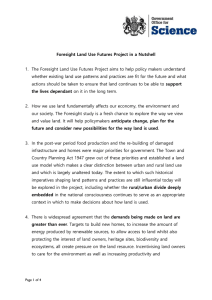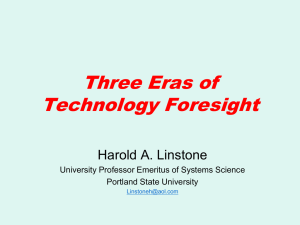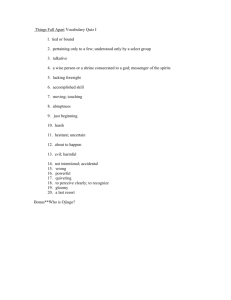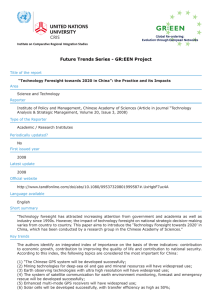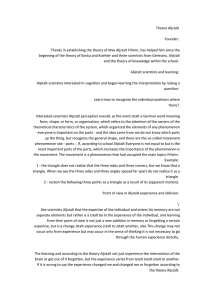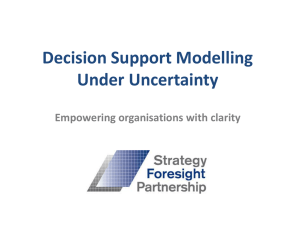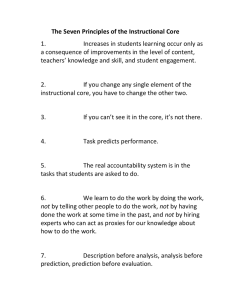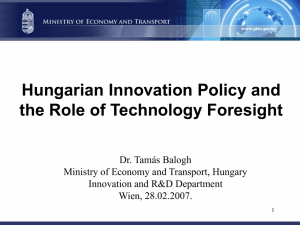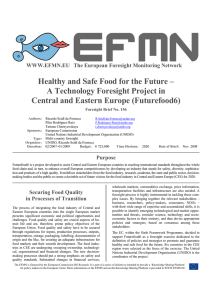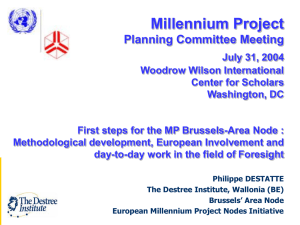Speech by President Barroso at the ESPAS Conference [C A D
advertisement
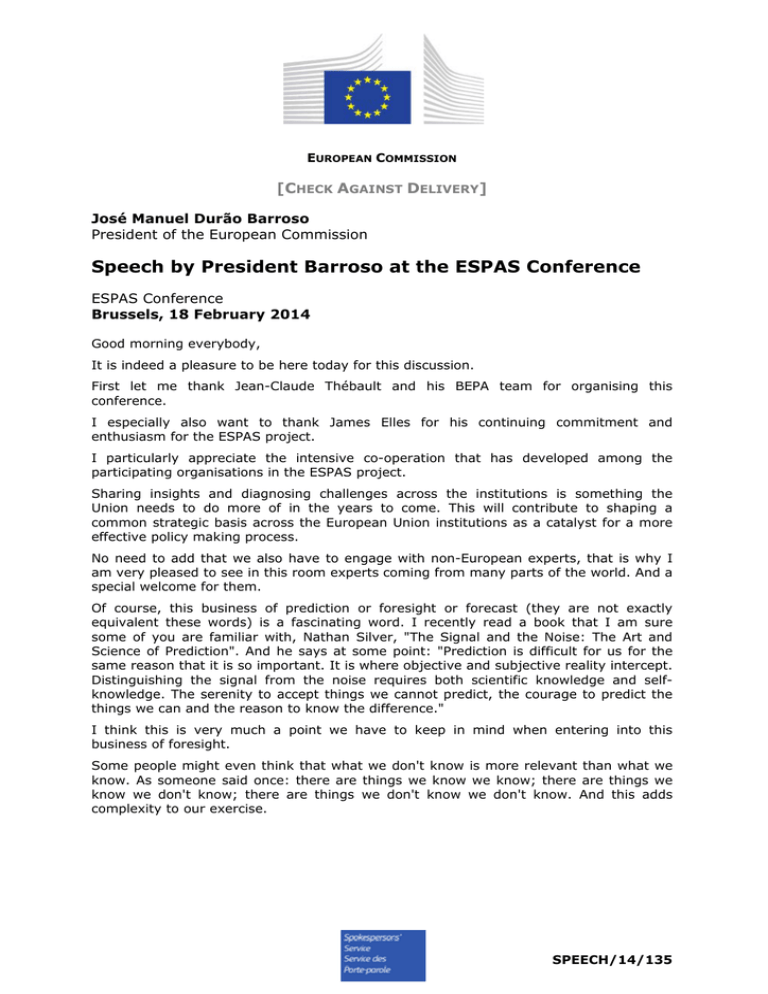
EUROPEAN COMMISSION [CHECK AGAINST DELIVERY] José Manuel Durão Barroso President of the European Commission Speech by President Barroso at the ESPAS Conference ESPAS Conference Brussels, 18 February 2014 Good morning everybody, It is indeed a pleasure to be here today for this discussion. First let me thank Jean-Claude Thébault and his BEPA team for organising this conference. I especially also want to thank James Elles for his continuing commitment and enthusiasm for the ESPAS project. I particularly appreciate the intensive co-operation that has developed among the participating organisations in the ESPAS project. Sharing insights and diagnosing challenges across the institutions is something the Union needs to do more of in the years to come. This will contribute to shaping a common strategic basis across the European Union institutions as a catalyst for a more effective policy making process. No need to add that we also have to engage with non-European experts, that is why I am very pleased to see in this room experts coming from many parts of the world. And a special welcome for them. Of course, this business of prediction or foresight or forecast (they are not exactly equivalent these words) is a fascinating word. I recently read a book that I am sure some of you are familiar with, Nathan Silver, "The Signal and the Noise: The Art and Science of Prediction". And he says at some point: "Prediction is difficult for us for the same reason that it is so important. It is where objective and subjective reality intercept. Distinguishing the signal from the noise requires both scientific knowledge and selfknowledge. The serenity to accept things we cannot predict, the courage to predict the things we can and the reason to know the difference." I think this is very much a point we have to keep in mind when entering into this business of foresight. Some people might even think that what we don't know is more relevant than what we know. As someone said once: there are things we know we know; there are things we know we don't know; there are things we don't know we don't know. And this adds complexity to our exercise. SPEECH/14/135 Let me tell you from my experience, at the start of each rotating Presidency of the Council I meet the new government, the new Prime Minister, who have that responsibility. And when we see the agenda for the next 6 months there is one thing I always tell them: what we have seen today was not the most important. The most important thing is something that we cannot predict now and I am sure it will happen during the next 6 months. And almost always, in fact, we had something that was not originally in the agenda of the Presidency and that happened and created a new challenge. That said it is a lot better what we can do if we focus on what we know and what we can understand better. This is precisely what ESPAS is about: analysing global trends and their implications for the European Union. In other words this is not so much about forecast but about foresight. And foresight is badly needed. Unpredictability cannot be avoided. But unfortunate political choices - or lack of proper political anticipation - due to insufficient or poorly understood information can and should be avoided. Therefore what policy makers expect from political scientists is sufficient and wellinformed policy options that allow them to make clear, strategic decisions or proposals for the longer term. And let me highlight one thing that comes very clearly from the work done so far by the ESPAS project. That it is impossible to go back to "business as usual." The recent crisis was a turning point in many aspects. I believe the world after the crisis will not be the same as before the crisis, so the idea to return to normality it's not adequate. This is why we have to think ahead and work together to help adapt to and to shape the future. As Winston Churchill said in a speech at Harvard University in 1943; "the empires of the future are the empires of the mind." This is true in the economic field where economic innovation and reform, and technological innovation, are crucial to make the economy work better and also to make growth more inclusive, smarter, and sustainable. But it is also important in the political field where leaders all over the world, especially in the so called emerging economies, face the need to adapt and respond to new demands and requests from their citizens, namely from the new emerging middle class. I am convinced that in this fast-changing world many of the solutions are going to come, in Europe and outside Europe, from science. There will be, we are already witnessing, not only important innovation in terms of technology but also breakthroughs in science. Some of these evolutions will come from technological and societal innovation. By the way, as you probably know, I've created, recently, a network inside the Commission of the experts on innovation and scientific matters under the coordination of my Chief Scientific Advisor, because we have in the European Commission many, many people, who are working in fields that until now they were separated in different DGs or with the JRC - one of the biggest facilities for research in the world. This world is becoming more complex and we need to integrate that complexity and variety in our political and economic systems. And I would like Europe to be leading, or co-leading, that effort globally. 2 And that comes to the point of democracy, including the point of the role of the individuals, because amidst all the trends and changing patterns there is a silver thread, the empowerment of the individual, be it through the technological innovations at the disposal of everyone, be it through a conscious action and behaviour. Something that was not very much integrated before. We were speaking about economic trends, we were speaking about demographic trends, we were speaking about political trends, but not so much about the increasing role of each human being. We now have to deal with a complex, unstable world where states no longer have the full monopoly of international relations. Leaders worldwide have to find ways to bridge this expectations gap between their citizens' aspirations and what they actually control and can deliver. I personally believe this is one of the reasons of the current crisis of populism. This perceived, let's say, gap between what leaders say and what leaders can really do and this is not specific to Europe. This is one of the main challenges also in a world with a multiplicity of actors, a strengthened interdependence, a growing case for cooperation, yes, but not necessarily an increased willingness to play along the same rules and with the same values. And this also applies to the European Union. Everybody recognise that we are more interdependent, as the financial crisis has shown, but there is not the corresponding will to integrate. Europe after all, in spite of its imperfections, can be a model to deal with diversity, complexity and multi-layered decision making has something to offer to the rest of the world. Without arrogance, that's very important. Without arrogance, because we have learned the hard way during the last century that arrogance does not pay off. It's not only morally inacceptable, but it's also not efficient. We need, nevertheless, to discuss with others what can integration, like the integration of Europe, bring to other parts of the world? Indeed, looking to Europe with more admiration than the admiration we Europeans sometimes show about our own project. The question now is how do we do it? What role and influence can the European Union have in this new global order in the making? How can we manage this global interdependence and bridge these governance gaps? These are indeed questions that call for a new thinking and a new mindset. Yes, also to some kind of foresight capabilities, but quoting again the book of Nathan Silver I mentioned before, I would like to say as he says: "Our bias is to think we are better at prediction than we really are. The first 12 years of the new Millennium have been rough, with one unpredictable disaster after another. May we rise from the ashes of these, beaten but not bowed, a little more modest about our forecasting abilities and a little less likely to repeat our mistakes." At the end, this is the purpose of any exercise, like the one you are engaging in. Let's try to avoid some of the obvious mistakes. Because if we avoid them, that is already a great contribution to the wellbeing, peace and freedom of our people. And let me conclude - with my European policy maker's hat - by saying that all the trends we can now analyse, from my point of view, call for a stronger, more united and more open Europe, and also a more political Europe as well. I thank you for your attention. 3

